Dyson is a well-known name in the world of air purifiers, but until now, I haven’t had the opportunity to test any of their models. However, some time ago, I purchased and thoroughly tested an air purifier from Dyson’s second generation, the Dyson TP02 Pure Cool Link.
This model features the classic Dyson tower-shaped design, premium build quality, and some innovative and exciting features. Although the Dyson Pure Cool Link is a somewhat older model, it is still one of the best choices and often the top preference among customers.
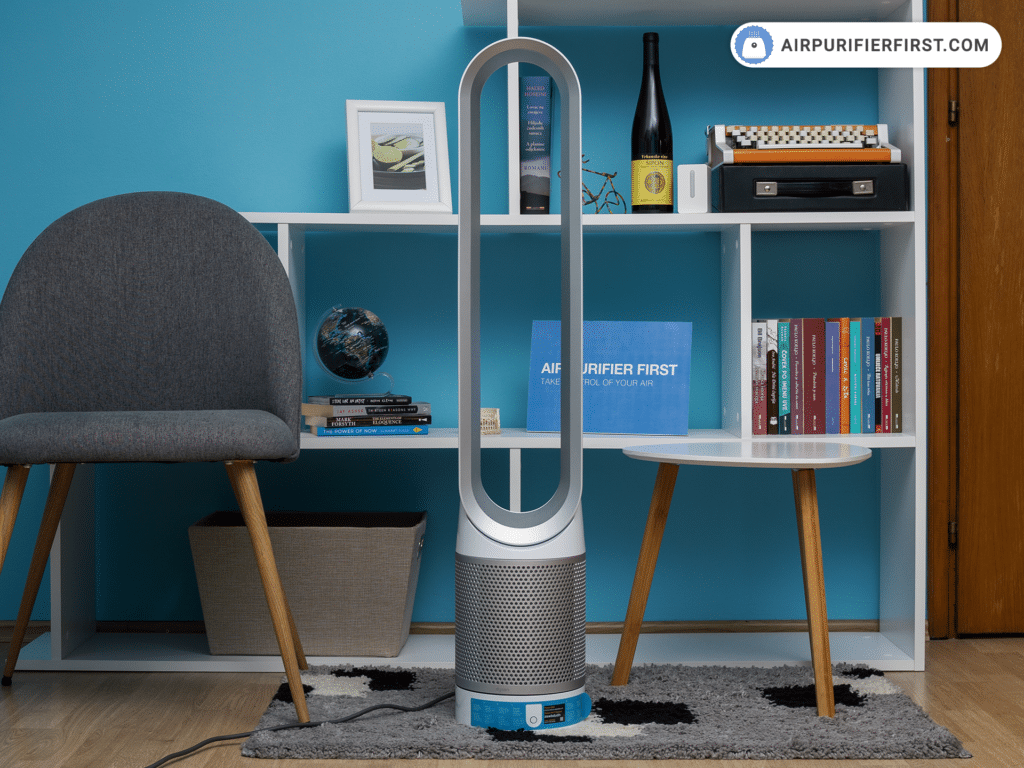
Table of Contents
Despite being a huge air purifier, the Dyson TP02 covers rooms of only 110 sq. ft., which is comparable to some much smaller air purifiers. In a room of mentioned size, it will clean the air approximately 4.8 times in an hour. This air purifier has a CADR of only 70 CFM.
It is equipped with a 360° Glass HEPA Filter, which consists of a HEPA filter and a carbon filter layer. I will elaborate more on the filter’s performance in the following sections, but I must mention that the Dyson TP02 pleasantly surprised me in all the performance tests.
In the following headings, I will describe all the features of this air purifier and present the results of performance, noise, and energy consumption tests. Based on all these evaluations, I will determine whether this device is worth purchasing.
In a Hurry? Here’s a Quick Summary of the Dyson TP02!
- Room Coverage: Dyson TP02 covers rooms of 110 sq. ft. with an ACH of 4.8, meaning it will clean the air 4.8 times in one hour.
- Filtration Technology: It uses a 360° Glass HEPA Filter, which has two filtration layers: HEPA and carbon.
- Smart Features: The TP02 has plenty of advanced options, of which the air quality sensor, smart app, auto mode, and oscillation feature are definitely the most interesting.
- Warranty: Dyson provides a 2-year warranty for this model.
Specifications
In the table below, I singled out the most essential specifications of this air purifier.
| Manufacturer | Dyson |
| Model | TP02 |
| Dimensions | 40 x 4.4 x 7.5 inches (101,6 x 11.2 x 19.1 cm) |
| Weight | 8.4 lb (3.8 kg) |
| Filters | HEPA Glass Filter and Activated Carbon Filter |
| Filter Longevity | about 12 months |
| Room Coverage (4.8 ACH) | 110 sq. ft. (10 m²) |
| Number of Working Modes | 10 – Speed 1, Speed 2, Speed 3, Speed 4, Speed 5, Speed 6, Speed 7, Speed 8, Speed 9, and Speed 10 |
| Power Consumption | 56W |
| Warranty | 2-year |
Setup and Installation
When it comes to setting up this device before its first use, the process isn’t complicated, especially since the device is well packaged, making it almost ready to operate straight out of the box.
After unpacking it from the shipping box, you only need to ensure that everything is in its place and remove all the protective tapes. And that’s all there is to it.
Afterward, place the Dyson in your desired location, ensuring there is a minimum distance of 10 inches from walls or other objects; plug it in, and turn it on! Please be careful when placing the Dyson air purifier, and don’t block the airflow, as that could potentially damage the device.
Design
When it comes to design, I must compliment the innovative and very attractive tower-shaped design of the Dyson TP02 air purifier. The model I purchased for testing is in a White/Silver combination, but there’s also an option to buy the Iron/Blue combination.
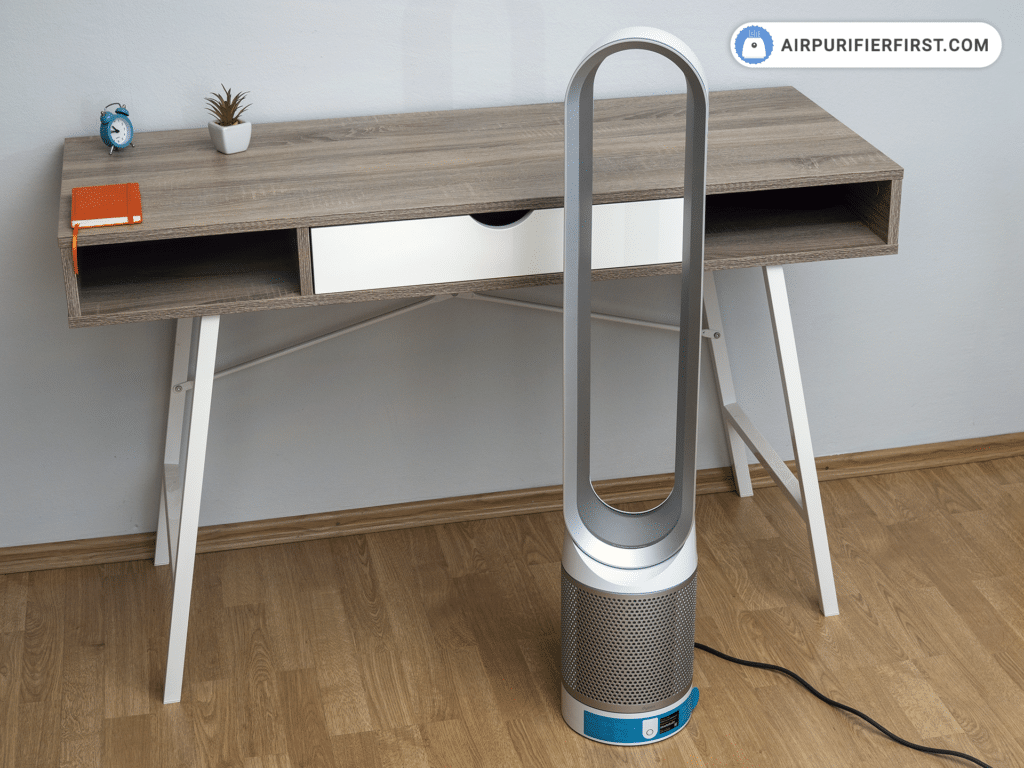
The Dyson TP02 consists of two parts: the lower part, which includes the filter, motor, display, and control button, and the upper part, which essentially functions as an extension with openings through which Dyson throws out the purified air.
The build quality is top-notch, and upon first contact with the device, you get the impression of its premium craftsmanship. The unit is made of plastic with some metal parts. One drawback I have noticed is that moving the device from one room to another can be awkward due to its large size and lack of carrying handles.
Overall, the Dyson TP02 is a modern air purifier that I’m sure will fit into almost any environment.
Controls
This Dyson model offers three different control methods: through the button on the device, via the remote controller, and via the smart application. The control button is placed at the bottom of the device, just below the display. It’s primarily used for basic operations like switching between fan speeds and turning the device ON/OFF.
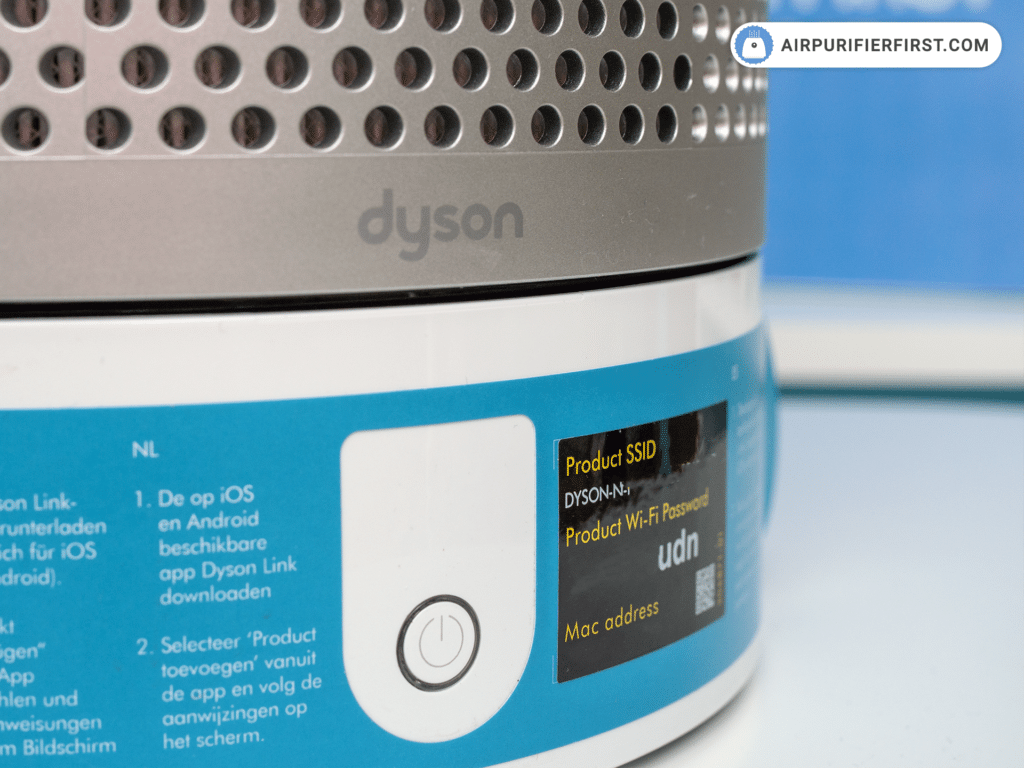
Opposite the control button, the remote controller allows you to manage almost all of the device’s operations. It provides easy access to options such as ON/OFF, Auto Mode, Airflow Control (Fan Speeds), Sleep Timer, Oscillation ON/OFF, and Night Mode.
Lastly, there is the MyDyson smart application, which is truly remarkable. Not only does it offer excellent remote control capabilities, but it also provides a detailed overview of air quality readings from the sensors, voice control settings, and plenty of other options, which I will explain later in the review.
Display
Dyson TP02 features a compact display that doesn’t show too much data. I would like it if it showed real-time air quality monitoring data, the same as seen in some of Dyson’s newer models.
In essence, the display shows indicators for basic controls accessible via the remote controller, such as current fan speed, auto mode indicator, night mode indicator, and WiFi indicator. Let’s focus on understanding the meaning of some of these indicators.
When the WiFi indicator lights in green, it indicates that the Dyson is ready to connect to the MyDyson application. If the WiFi indicator flashes white, the device is in the process of connecting with the app. A solid white WiFi indicator confirms a successful app connection, while the lack of any indicator signals that the device is powered off.
The “A” indicator indicates that the auto mode is activated. If it glows in green, it means that air quality is at a good level, but if it lights in white, the air quality hasn’t yet reached an optimal state.
The display may also show error codes. If you see the letter “E” on display, it indicates that the Dyson can’t execute a specified operation, prompting a need to inspect your device. In such a situation, I recommend resetting the air purifier by turning it off, unplugging it, and waiting for 60 seconds before powering it on again. If the issue persists, then I would contact Dyson directly and ask for assistance.
Additionally, you may come across an “F” code along with three flashing bars, signaling that it’s time to replace the filter.
Airflow
The Dyson TP02 has a cylindrical shape, and we can say that it consists of two parts. The lower part is where the air intake openings are, arranged around the entire device in a 360° way.
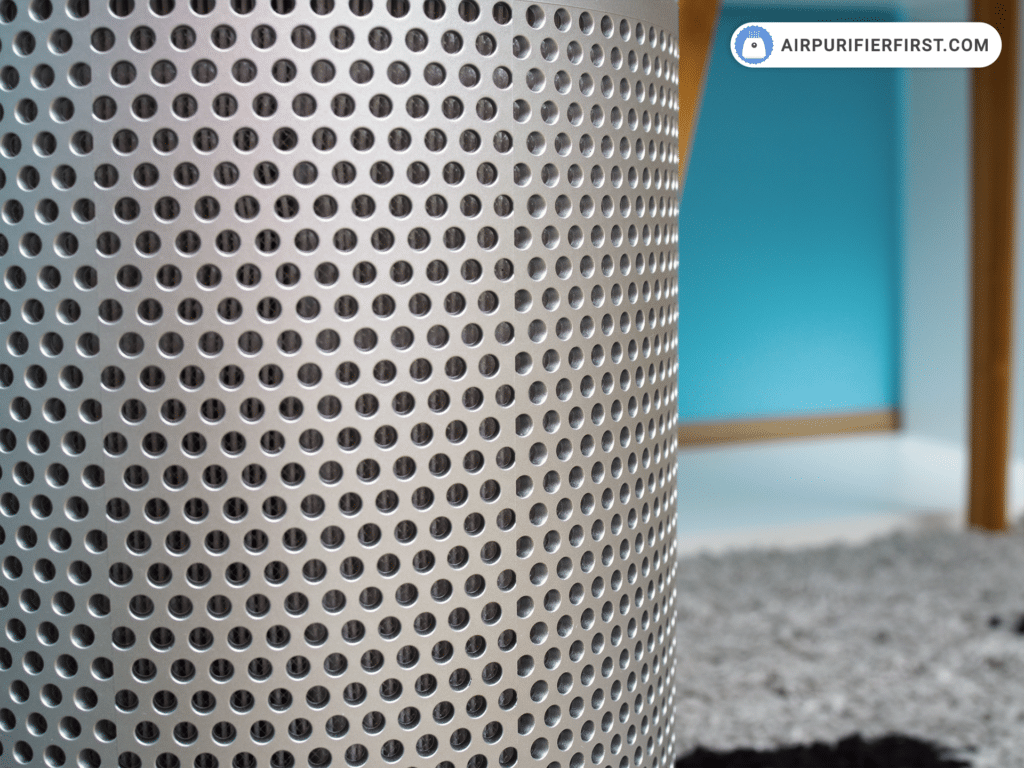
Air is drawn in through these openings; it’s then filtered and released through the openings located on the upper part of the device.
Size and Dimensions
This is undoubtedly the tallest air purifier I’ve had the opportunity to test so far. The dimensions of the Dyson TP02 are 44.5 x 8.6 × 8.6 inches (11.31 x 21.9 x 21.9 cm). However, surprisingly, this air purifier doesn’t weigh much; it’s only 8 lbs (3.8 kg).
When discussing its large dimensions, I would point out the lack of carrying handles as a slight drawback. Nonetheless, given its remarkably lightweight nature, I am confident that transporting it from one room to another will not cause you much trouble.
What Will You Get In the Box?
When you purchase the Dyson TP02 air purifier, you’ll get 1x Air Purifier, 1x 360° HEPA Glass filter, 1x Power Cord, and 1x User Manual.
I want to underscore the importance of reading the user manual before starting the air purifier for the first time. Alternatively, you can check out the summarized version of the installation process I described at the beginning of the review.
Features Overview
The Dyson TP02 is a powerful air purifier equipped with many advanced features. This device has everything that makes an air purifier premium and meets all user needs.
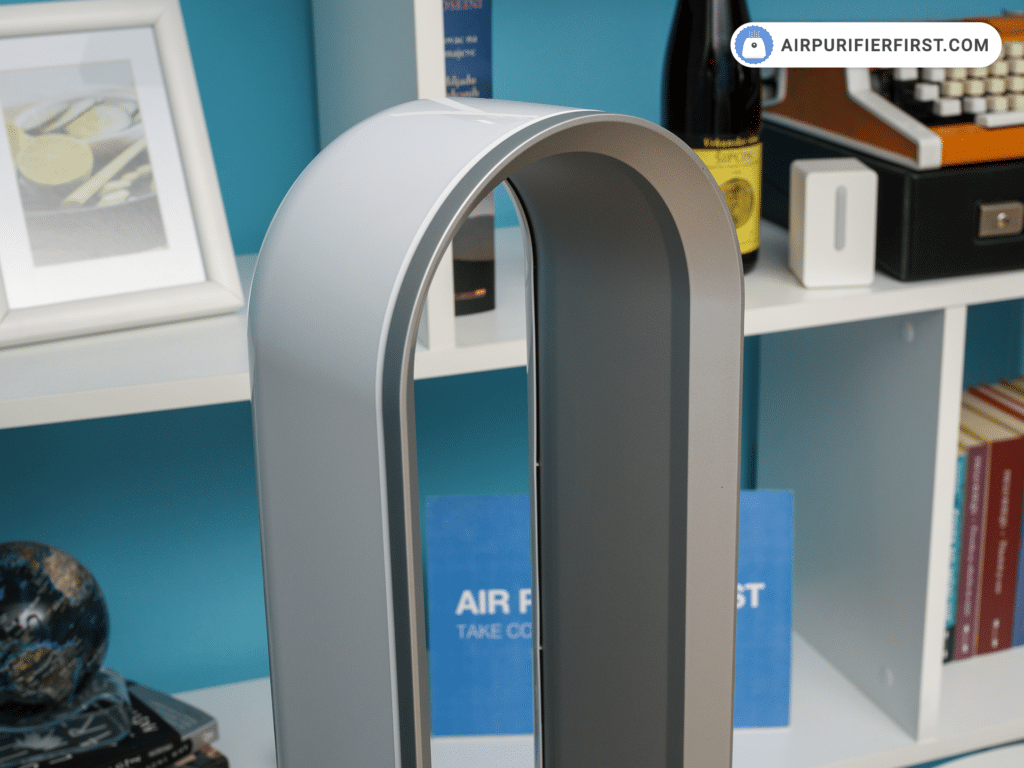
These advanced functions not only contribute to more detailed monitoring of air quality in your home but also ease everyday usage of the air purifier.
Air Quality Sensor
The Dyson TP02 has an air quality sensor that continuously monitors indoor air quality. This sensor works in combination with the auto mode and MyDyson smart app.
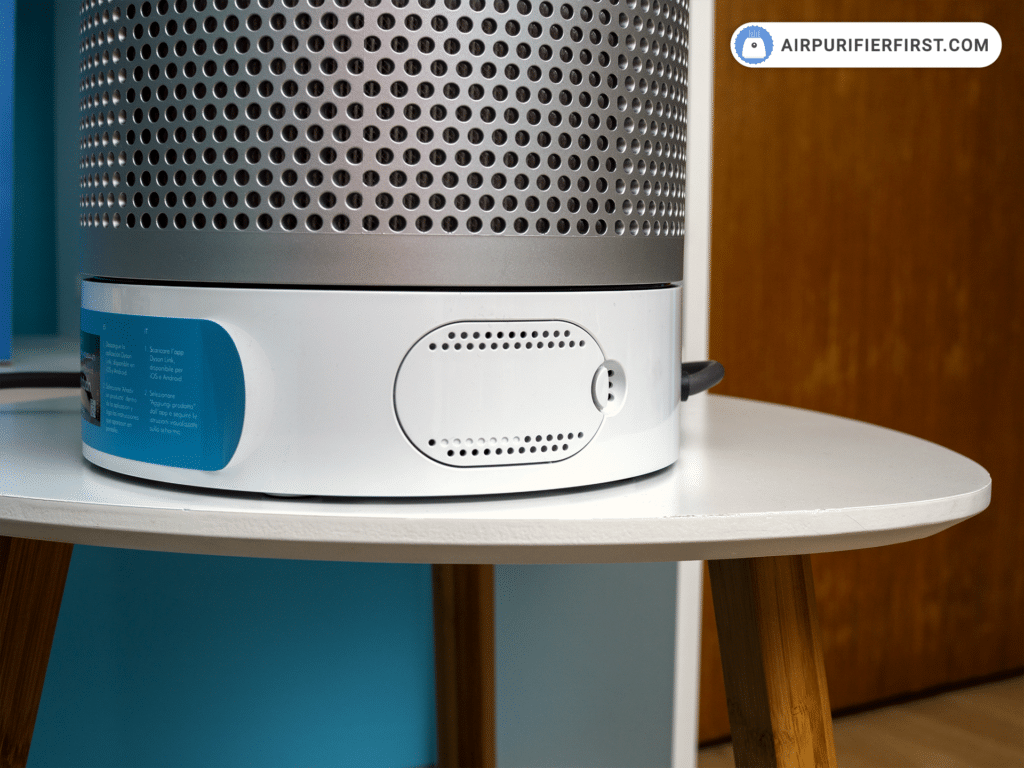
The auto mode adapts the air purifier’s fan speed according to the data received from the air quality sensor while always ensuring the best performance. On the other hand, the MyDyson smart app shows the air quality data, and what’s best, it archives this data so you can check your historical air quality data whenever you want to.
Such advanced features befit a premium air purifier like the Dyson.
Auto Mode
The auto mode is one of my favorite features of this air purifier. It works in combination with the air quality sensor. So, when the Dyson TP02 operates in auto mode, it intelligently adjusts the fan speed based on the current air quality.
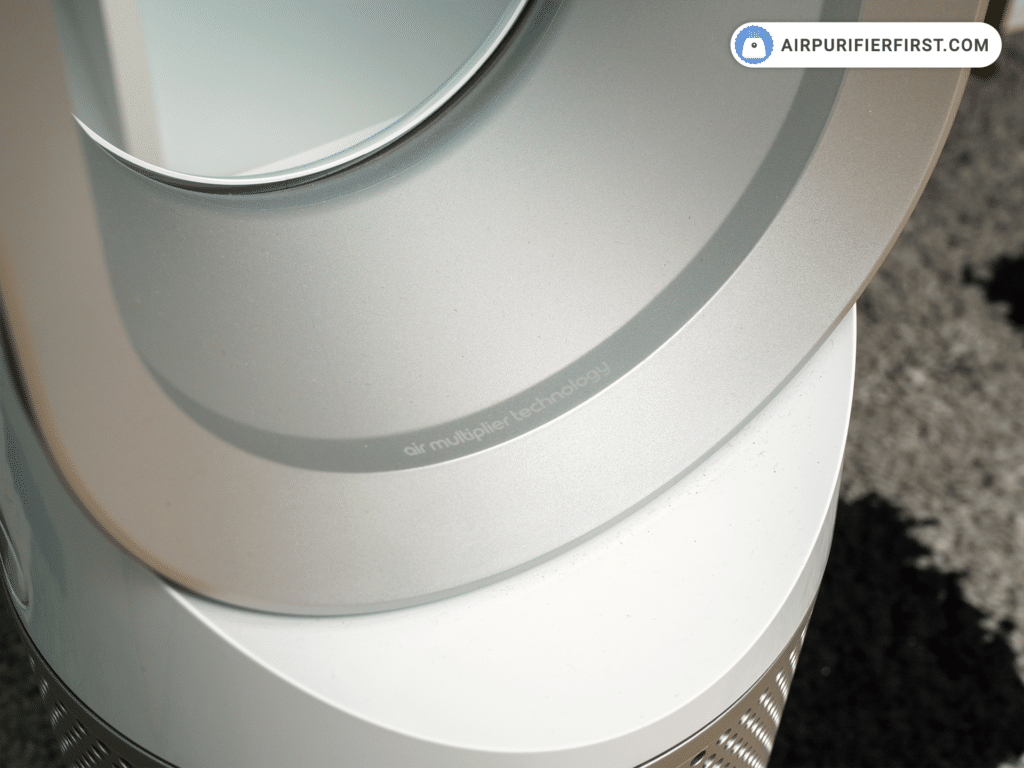
If the air quality is poor and the Dyson is set to auto mode, it will automatically raise the fan speed up to the maximum level. Contrarily, as the air quality improves, the air purifier will slowly reduce the fan speed to lower levels. This is essentially how the auto mode operates.
When the auto mode is activated, you’ll notice the “A” indicator on the display. If this indicator glows in green, it indicates that the air quality in your place is optimal, prompting the air purifier to enter standby mode while continually maintaining the air quality. If the air quality worsens, the fan speed will adjust accordingly.
The way it maintains the fan speed based on air quality reminds me of the ECO Mode in the Coway AP-1512HH or the Levoit Core 400S air purifier auto mode.
Smart App
Dyson TP02 can be connected to the MyDyson smart application, which provides remote control, detailed readings from the air quality sensor, and various other options.
This is a highly beneficial addition that raises Dyson to a higher level. I’m truly delighted with the MyDyson smart app and its easy setup. Especially as I’ve had the opportunity to test some premium air purifiers with flawed smart applications. One such example is the Molekule Air, which I couldn’t connect to the smart application at all.
With Dyson, that’s not the case, as the device connects effortlessly with the app in just a few simple steps without any issues.
Sleep Timer
The sleep timer operates much like the classic timers seen on nearly every air purifier available on the market.
In essence, you can set the desired time for your Dyson to automatically turn off. However, with the Dyson TP02, the air purifier won’t actually power off; instead, it will switch to standby mode.
Night Mode
When switched to night mode, the Dyson TP02 will dim the display and operate quietly, allowing you to use it in a bedroom or similar space.
After activating the night mode, a half-moon symbol will appear on the display, and after 5 seconds, the entire display will dim while the half-moon icon remains slightly visible.
If the device is in auto mode when night mode is being activated, the fan speed will automatically switch to the fourth level. However, if the device is already set to any speed below the fourth level, that setting will remain unchanged.
Oscillation
The oscillation feature is an innovative option unique to Dyson air purifiers, and it’s directly connected to the specific design of the Dyson TP02 air purifier.
Once you activate the oscillation mode, the Dyson will smoothly rotate left and right by 70°, effectively directing the airflow (clean air) across a larger area, ensuring the clean air spreads throughout the whole room.
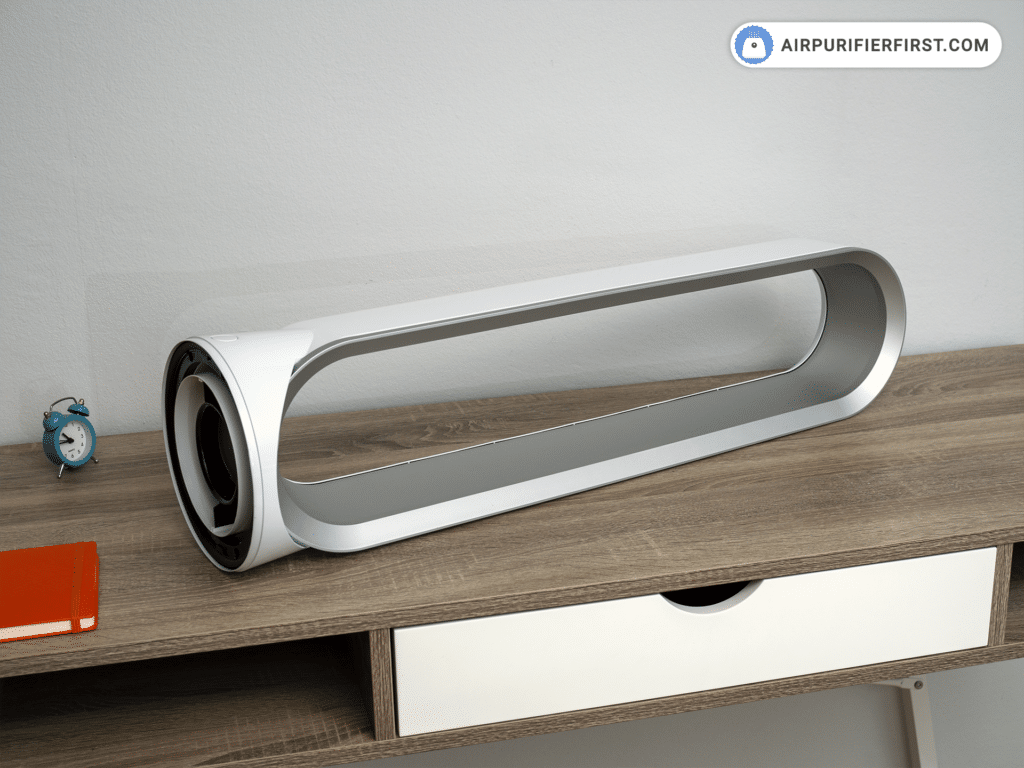
Frankly, I didn’t know what to expect from this mode, as it’s the first time I’ve encountered such a feature, but I’m pleasantly surprised. In my opinion, this is one of the best innovations I’ve come across in an air purifier, making the Dyson TP02 truly stand out.
Remote Controller
In the section where I described the controls of this air purifier, I explained the functions of the remote controller, so I won’t go into detail about them again.
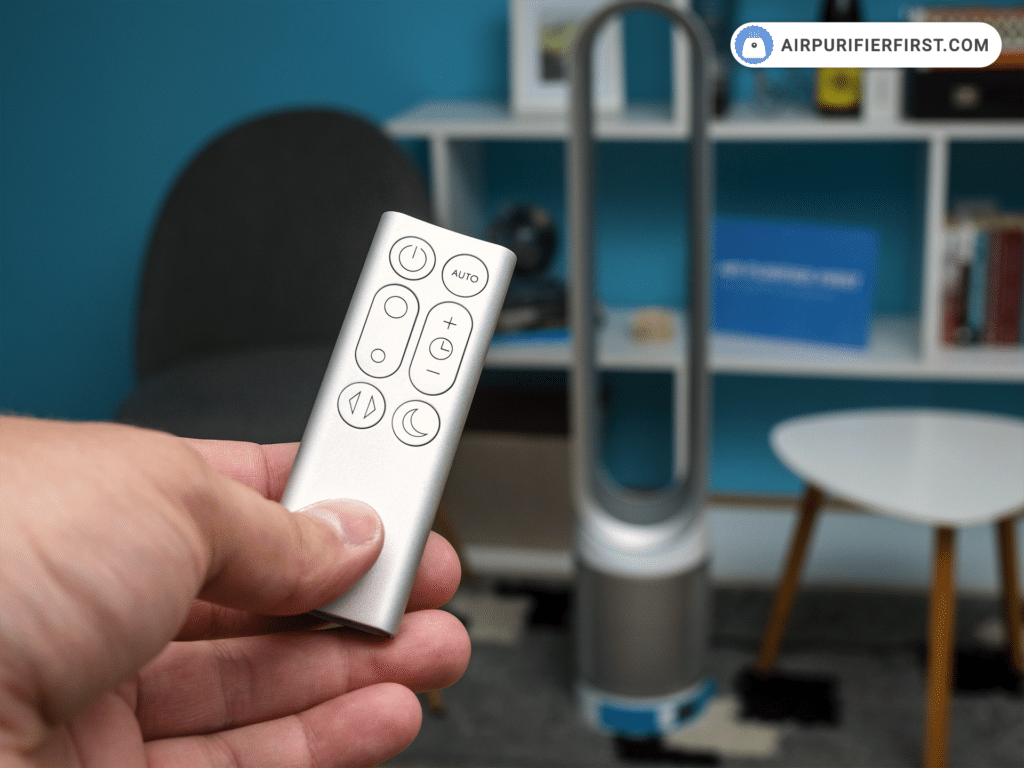
What I’d like to emphasize further is that Dyson has a magnet on top of it, allowing you to attach the remote controller there. This ensures you will always remember where you left it.
Additionally, if you ever lose the remote controller, you have the option to purchase a replacement directly from the Dyson website, at a very reasonable price. Alternatively, you can use the MyDyson app, which offers the same controls as the physical remote controller.
Warranty
Dyson provides a 2-year warranty for the Pure Cool Link TP02 model. The warranty covers both the entire air purifier and the remote controller.
Also, Dyson’s customer support is top-notch. I’ve contacted them several times and received a quick response to all my questions each time.
Room Coverage & CADR
The Dyson TP02 has a CADR of 70 CFM, making it ideal for rooms up to 110 sq. ft. In a room of this size, the Dyson will clean the air approximately 4.8 times in one hour. ACH (air changes per hour) of 4.8 times is an industry-standard set by AHAM.
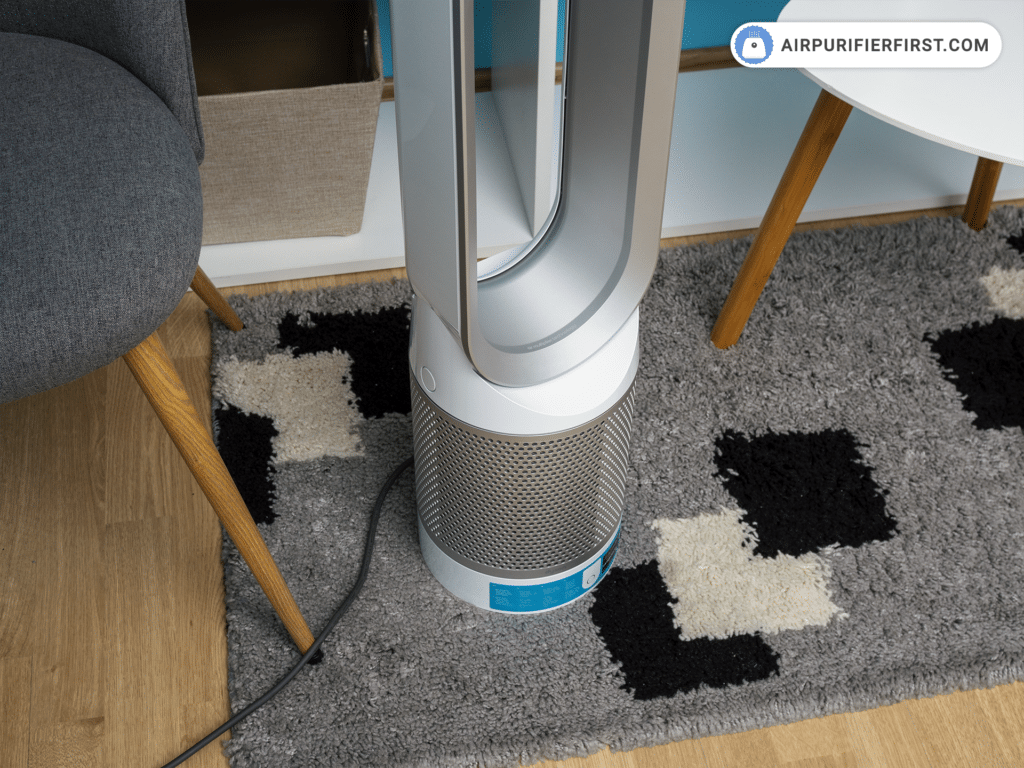
This also means that the Dyson TP02 will clean the air once in one hour in a room of 500 sq. ft. (1 ACH).
Frankly, I always adhere to AHAM’s recommendations and don’t use devices in rooms larger than the recommended size. However, considering that the Dyson TP02 has shown excellent performance results in tests, I believe this model could perform very well even in slightly larger rooms than the recommended dimensions.
Filtration Technology
The Dyson TP02 uses an innovative 360° Glass HEPA Filter, which consists of two filtration stages – a HEPA filter and a carbon filter. This cylindrical-shaped filter is placed inside the bottom part of the device.
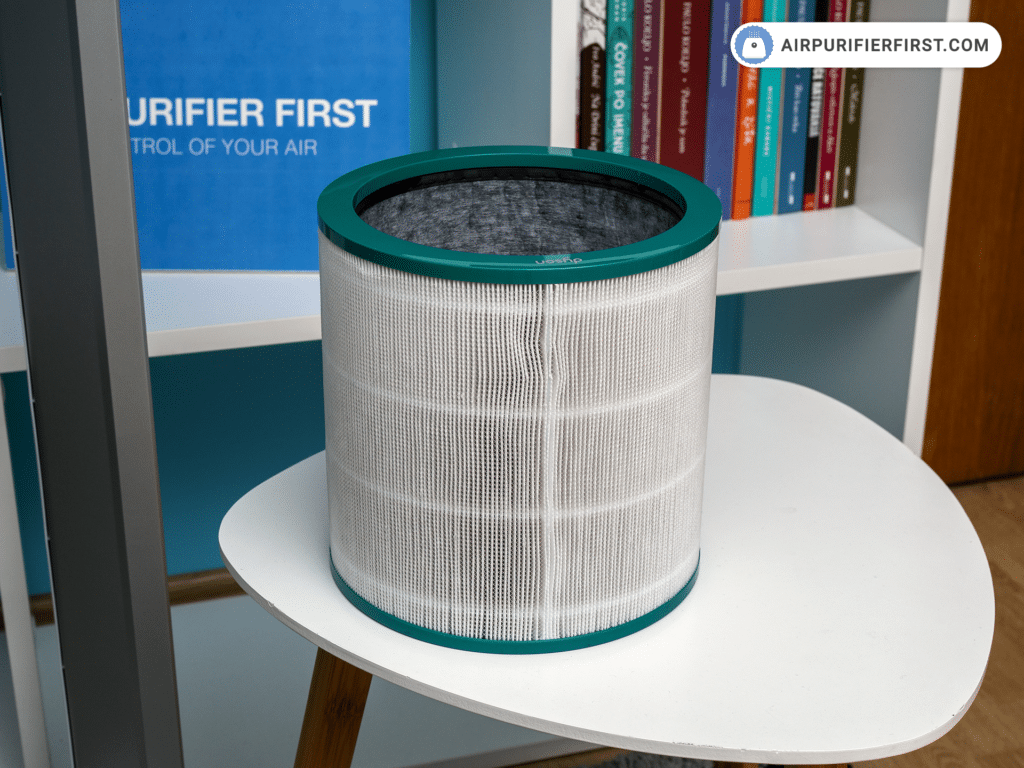
Dyson’s HEPA filter removes 99.97% of airborne particles as small as 0.3 microns in size, which is similar to the traditional True HEPA filter’s performance. This includes dust, mold spores, allergens, pollen, and other pollutants. It’s undoubtedly the essential and most crucial stage of filtration in this air purifier and the reason why the Dyson TP02 performed so well in performance tests.
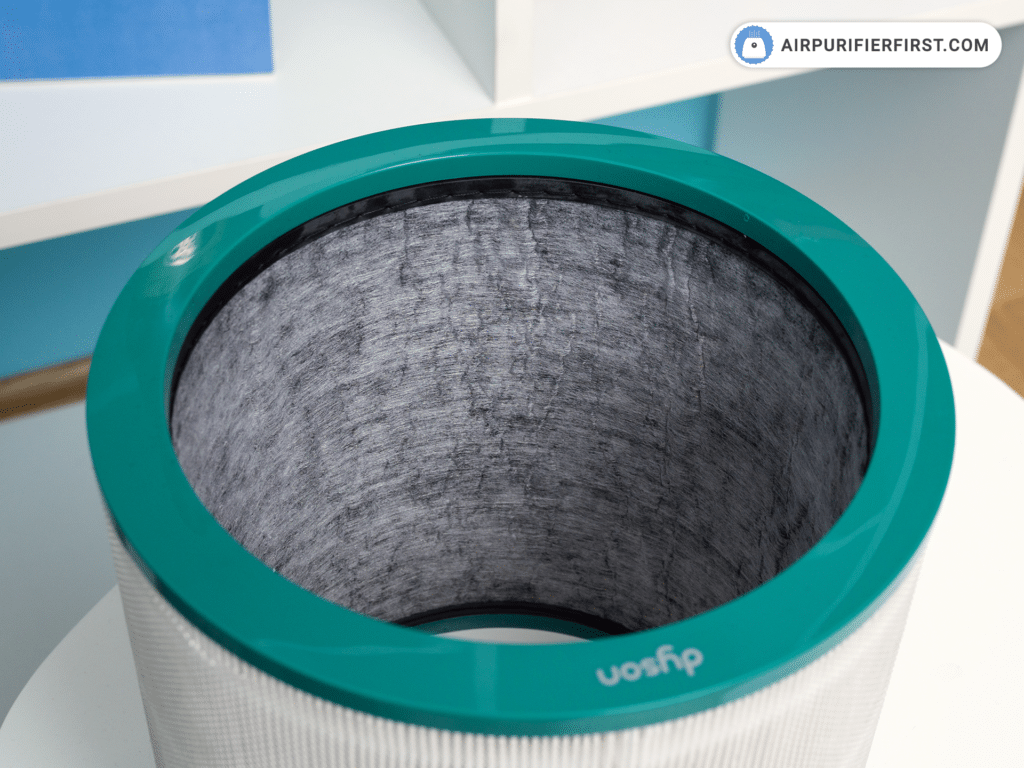
The second filtration stage is the carbon filter, which neutralizes bad odors, smoke, and VOCs. Since this filter isn’t pellet-based but a fibrous filter coated with carbon, I must say I am impressed with the performance it delivers. However, I wouldn’t recommend using it in places with extremely strong odors and high VOC pollution.
Actually, I used the Dyson TP02 in my kitchen for some time, and it didn’t do so well in neutralizing some cooking smells, especially the fried fish smell—more on this in the performance test section.
Initially, the lack of a pre-filter may have seemed like a drawback. However, even though Dyson hasn’t stated that there is a pre-filter, there is a nylon mesh attached to the HEPA filter, which acts as a pre-filter on many competitive air purifiers; so we can say the same for the nylon mesh on this Dyson.
No matter if it’s characterized as a pre-filter or not, I suggest cleaning it from time to time, at least twice per month. In that way, you will prolong the HEPA filter’s life and keep the performance high.
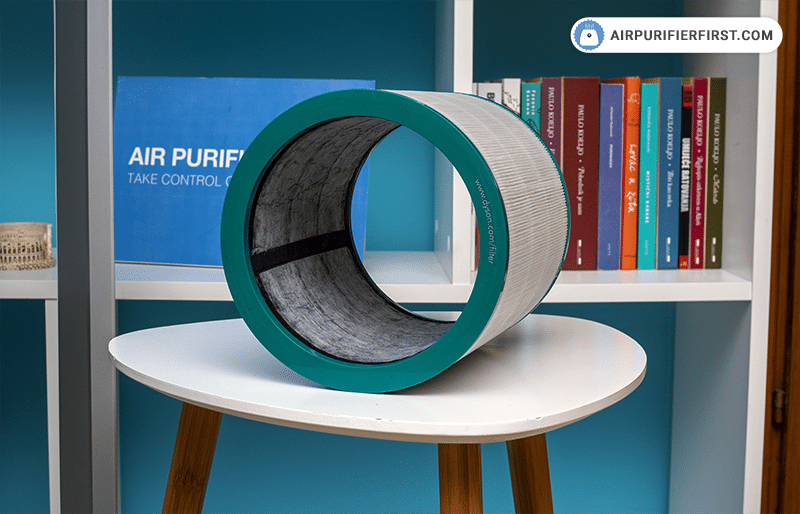
Dyson TP02 Replacement Filter
Always buy genuine filters for the best performance. As soon as the filter reset indicator is on, you are ready to change filters. Do it as quickly as possible.
CHeck Filter Price On AmazonFurthermore, I strongly recommend always purchasing genuine Dyson filters, despite some third-party filters available on the market that are significantly cheaper. After all, what’s the point of having an air purifier with a third-party filter that doesn’t guarantee as high efficiency as the original ones?
Noise Test
I hadn’t come across an air purifier with ten fan speeds before, so the Dyson TP02 amazed me. I really like this feature because it offers almost every user the option to adjust the noise level according to their needs without compromising much on performance. So simply put, if the tenth speed is too loud for you, switch to the eighth; your Dyson will work quieter but still deliver a great performance.
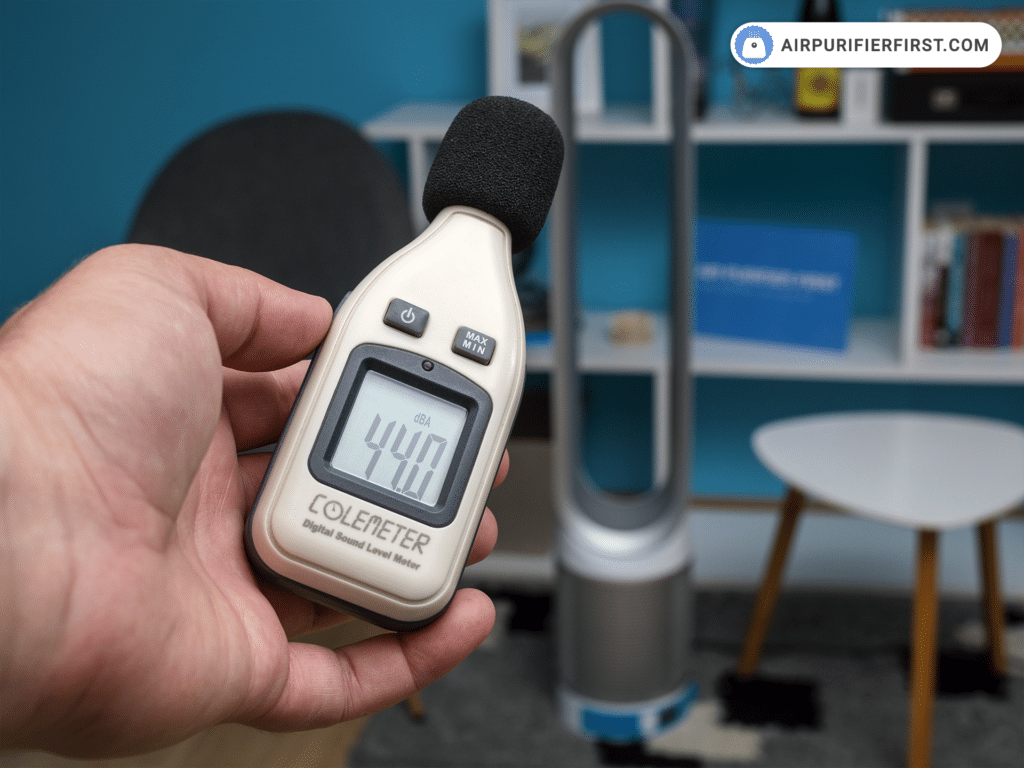
Using a special tool for measuring noise levels, I tested the noise levels of the Dyson TP02 at all speeds.
The Dyson TP02 produces only 41.1 dBA at the first speed and about 46.2 dBA at the fifth (middle) speed. Another indication of the well-optimized motor is the noise level of only 59.6 dBA at the maximum speed, which, although fascinating, is still within the range of some competitive devices with similar performance.
To help you compare the noise levels of this Dyson air purifier at all speeds, take a look at the table below, where I listed noise levels produced for all speeds.
| Speed | Value (dBA) |
|---|---|
| Speed 1 | 41.1 dBA |
| Speed 2 | 43.6 dBA |
| Speed 3 | 44.2 dBA |
| Speed 4 | 44.7 dBA |
| Speed 5 | 46.2 dBA |
| Speed 6 | 48.7 dBA |
| Speed 7 | 50.6 dBA |
| Speed 8 | 54.0 dBA |
| Speed 9 | 57.1 dBA |
| Speed 10 | 59.6 dBA |
Overall, the Dyson TP02 is a quiet air purifier ideal for places such as bedrooms, living rooms, kids’ rooms, offices, or similar places.
Performance Tests
When it comes to performance, I test every air purifier’s performance in separate rooms using the Temtop laser particle meter.
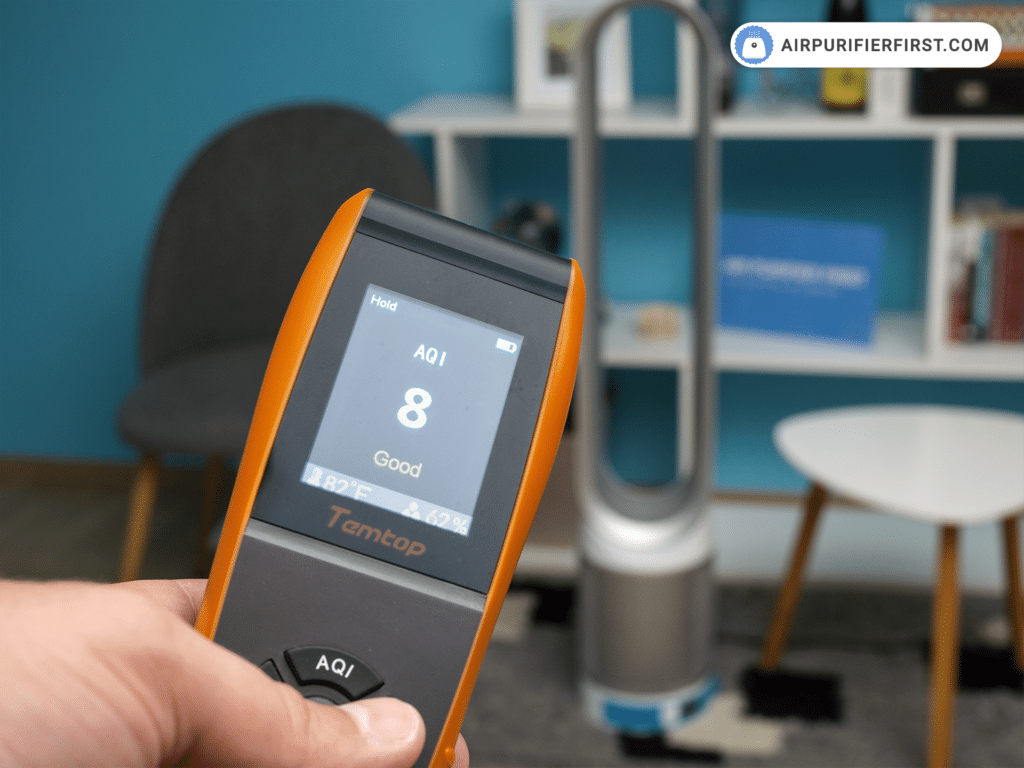
Besides this test, I used almost all air purifiers I have tested so far in my home for some time to get a better picture of the device’s performance and usage in real-life situations. I did the same with the Dyson TP02, but what’s interesting here is that I continued using it after I completed all the tests.
The reason is simple – besides effectively purifying the air, the Dyson TP02 also provides outstanding cooling, making it a great choice during hot summer days (which was at the time of my testing).
I also noticed that despite having a small carbon filter, it produced a quite acceptable performance in eliminating everyday odors like cooking odors and similar unpleasant smells. However, you may need an air purifier with better carbon filters for more demanding challenges, such as neutralizing the strong smell of fried fish.
120 sq. ft. Room Test
In the first test, in a room of 120 sq. ft., which is slightly larger than the recommended dimensions, the Dyson TP02 made fantastic results, improving the air quality by approximately 93% in just 60 minutes of operation at max speed.
| # | Starting Baseline | After 60min |
|---|---|---|
| PM 2.5 | 107.4 | 8.2 |
| PM 10 | 150.4 | 10.8 |
| Particles | 155846 | 11489 |
| AQI | 140 | 10 |
I must admit that the result of this test positively surprised me, and it clearly demonstrates the high quality of the Dyson brand. It confirms that the Dyson TP02 can clean the air in even larger rooms than recommended without compromising performance.
Operating Costs
The Dyson TP02 uses a motor of 56W, which isn’t too powerful, but I still expected it’s better optimized for the power-CADR ratio.
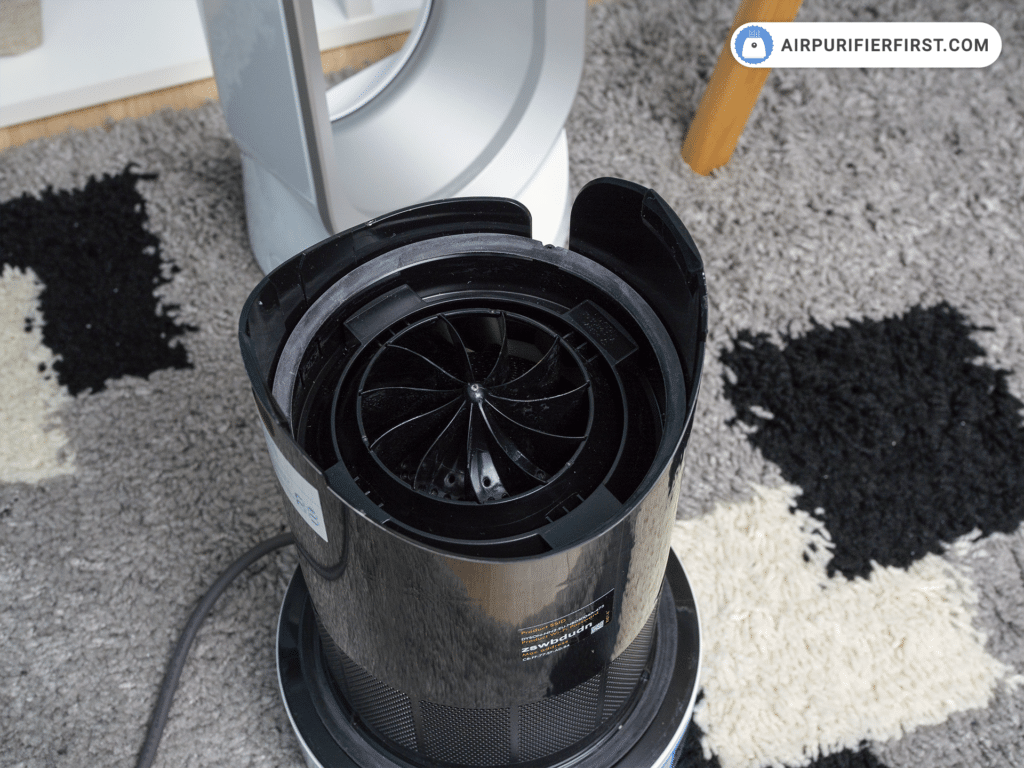
With a CADR of just 70 CFM, it’s in the range of some small air purifiers such as the Levoit Core 300S or Core 200S.
I tested the power consumption of the Dyson TP02 air purifier at all speeds, and you can see the individual results in the table below.
| Speed | Power Usage (W) |
|---|---|
| Standby | 3.4W |
| Speed 1 | 3.5W |
| Speed 2 | 4.1W |
| Speed 3 | 5.4W |
| Speed 4 | 7W |
| Speed 5 | 9.5W |
| Speed 6 | 15.2W |
| Speed 7 | 19W |
| Speed 8 | 28.7W |
| Speed 9 | 39.5W |
| Speed 10 | 51W |
Interestingly, this Dyson model consumes only 3.5W at the first speed and 51W at the maximum speed. This means that if you were to use this air purifier on max speed for a month, running it 24 hours a day, your electricity bill would increase by about $4.5. While this may not be a significant cost, I believe Dyson could have better optimized this motor or better─improved the airflow performance.
Besides the electricity costs, there’s also the cost of the replacement filter, which fortunately last relatively long and doesn’t need to be changed as often. However, the price of the replacement filter is slightly higher than the competition’s. The good thing (might be) is that many third-party filters are available on the market, but I wouldn’t recommend going with these. I would always opt for genuine Dyson filters.
My overall conclusion is that the Dyson TP02 could be a bit cheaper for maintenance.
Dyson TP02 Air Purifier – Video Review
If you prefer video reviews over contextual ones, you can watch our video review of the Dyson TP02.
FAQ on Dyson TP02
Does Dyson TP02 produce ozone?
No, it doesn’t. The Dyson TP02 doesn’t use an ionizer, UV-C light, or any other technology that could produce ozone.
Can I run my Dyson TP02 all the time?
Absolutely, you can use this air purifier 24/7 without any issues. However, it’s essential to keep in mind that running 24/7 may lead to faster filter wear, resulting in higher maintenance costs annually.
Can a Dyson TP02 filter be washed and reused?
No, the Dyson TP02 doesn’t use washable or reusable filters, and I strongly advise against washing these filters. Instead, replace them as soon as the filter reset indicator appears on the display. This indicator is shown as “Code F” with three flashing bars next to it.
How long does the Dyson TP02 filter last?
On average, the Dyson filter lasts for about 12 months if you use the device for no more than 12 hours daily. However, if you use the device continuously for 24 hours daily, the filter’s lifespan reduces to approximately 6 months.
What is the warranty for Dyson TP02?
The Dyson TP02 comes with a 2-year warranty.
What is the length of the power cord for Dyson TP02?
The power cord of this air purifier is approximately 6.6 feet (2m) long and can be detached from the device–it is not fixed.
Pros and Cons
Below, you can see the advantages and disadvantages of the Dyson TP02 air purifier.
Leave a Reply